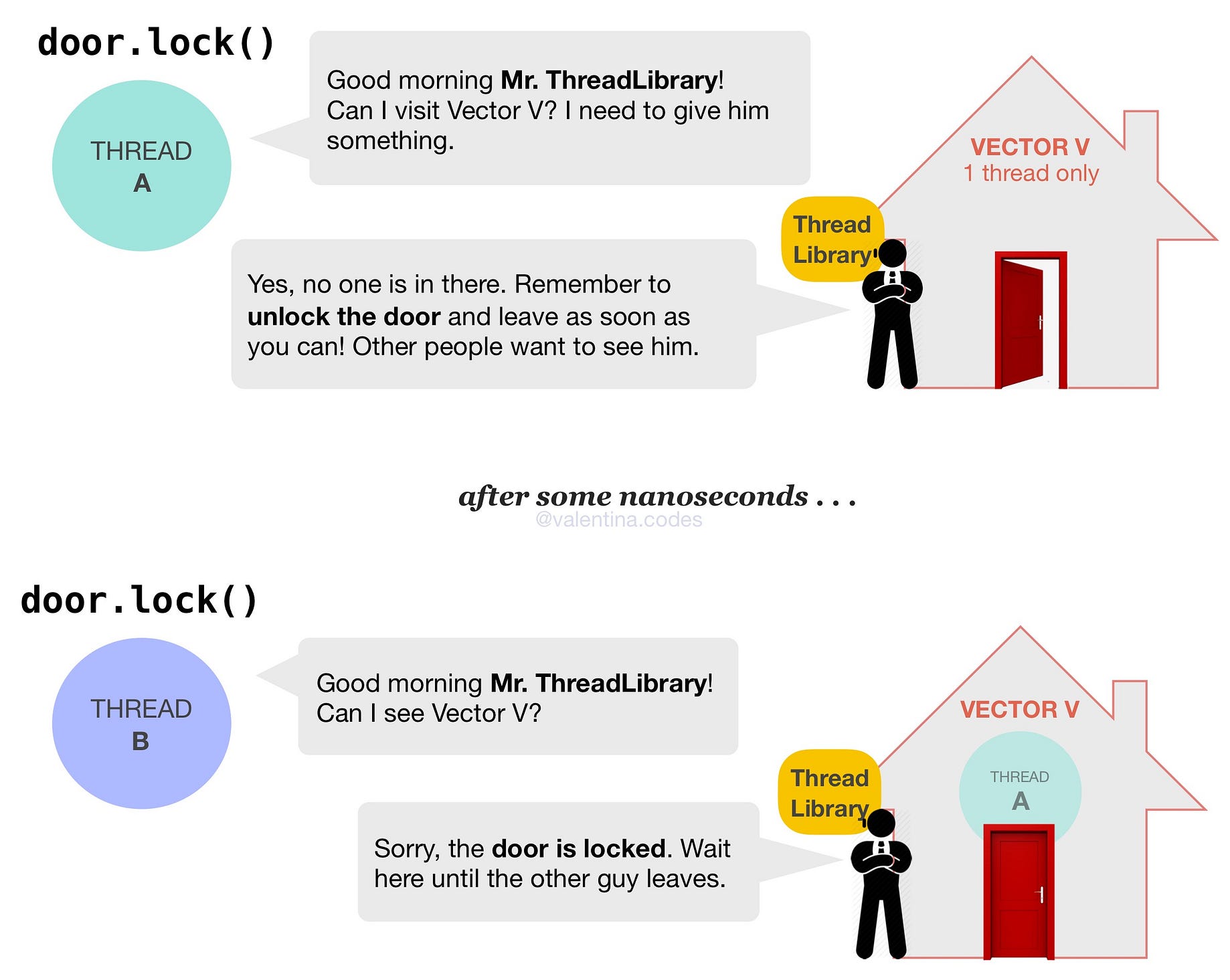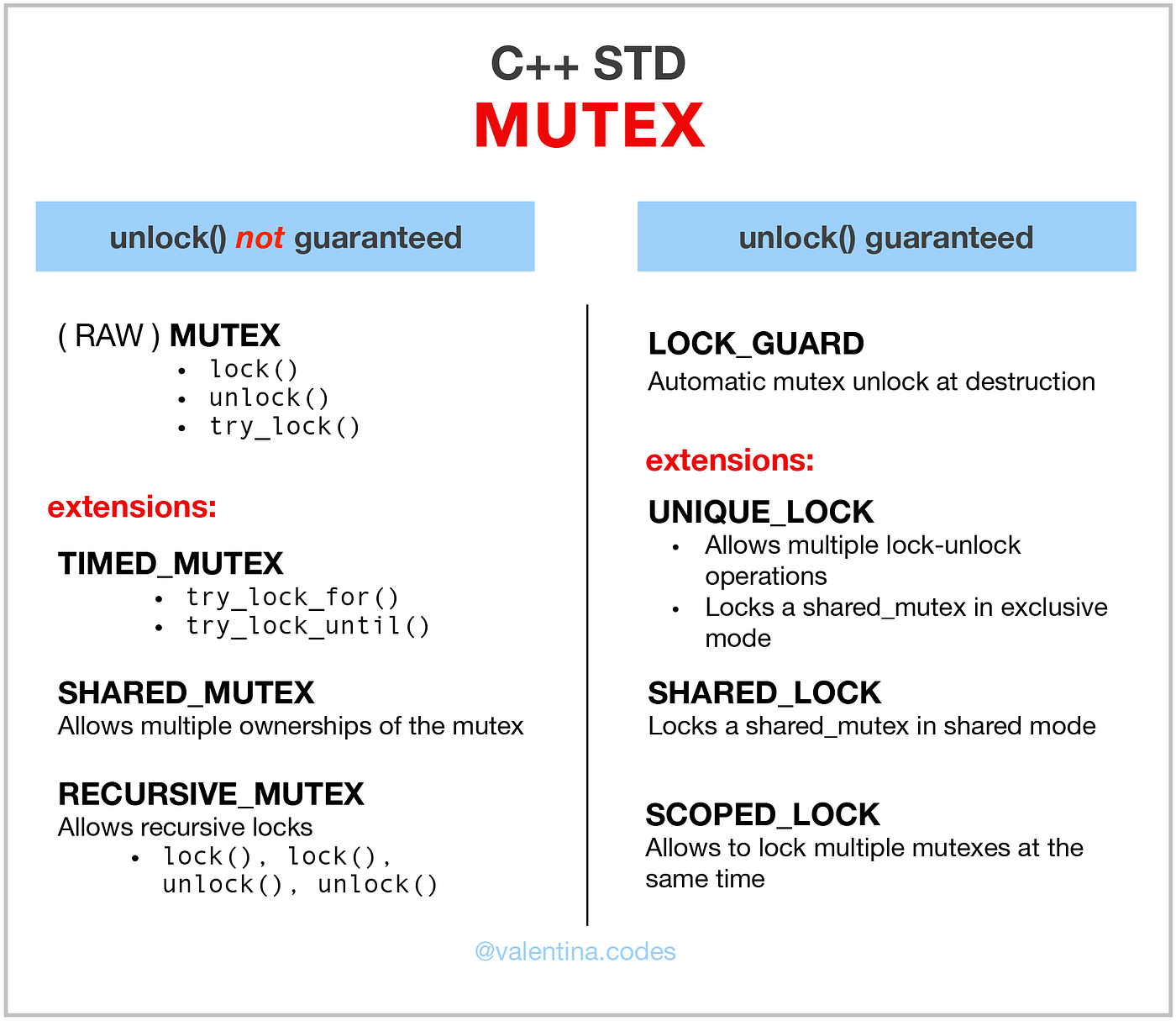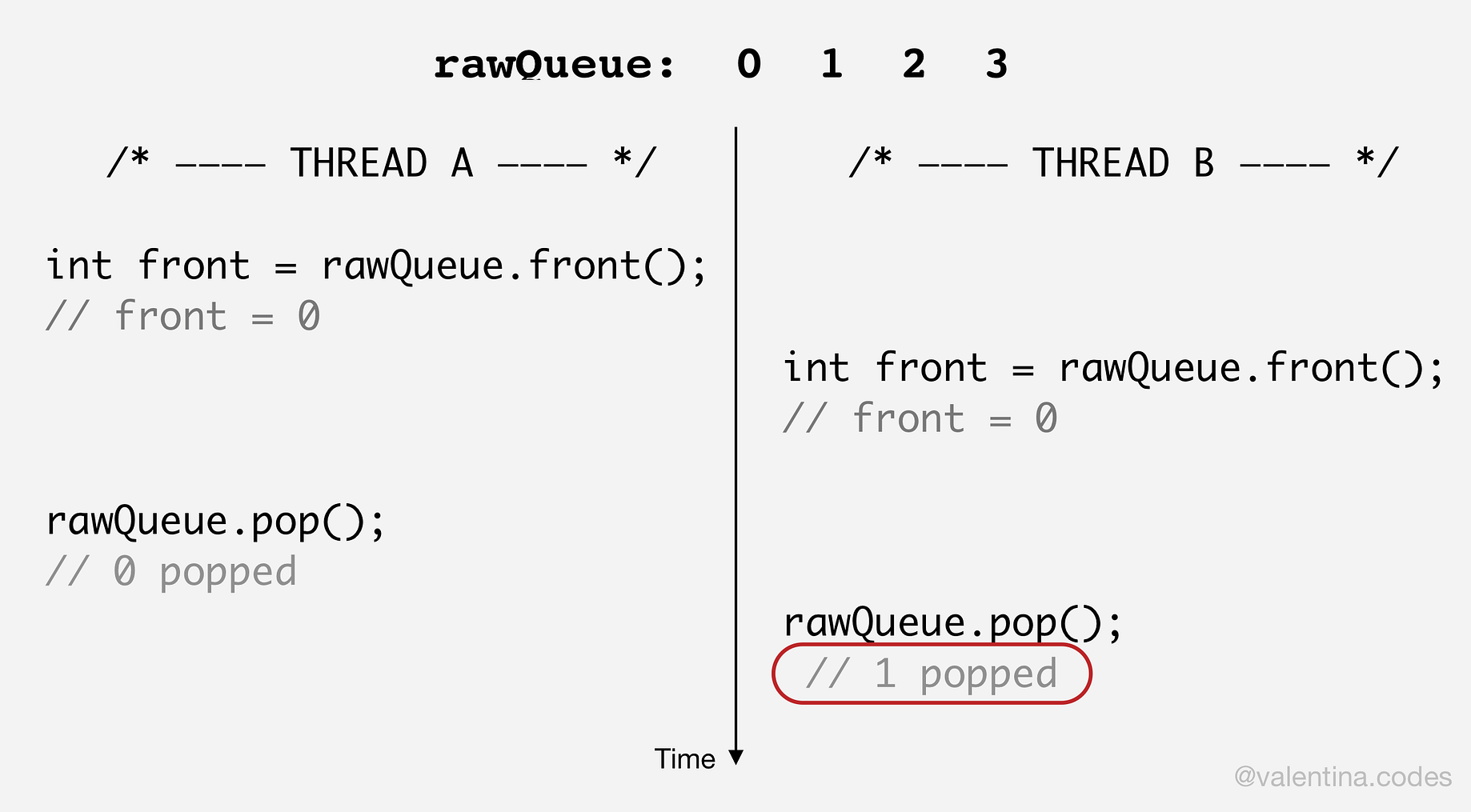C Scoped_lock Vs Lock_guard
Stdtry_to_lock allows for trying a lock without blocking. Strategized Locking Thread-safe Interface and Scoped Locking Patterns and Idioms for Simplifying Multi-threaded C Components Douglas C.

Programming Concurrency In C Part 2 Codeproject
The fun part is at the second end condition test the call to lk_lock gets short-circuited we exit the loop and go on with our lives.

C scoped_lock vs lock_guard. When a scoped_lock object is created it attempts to take ownership of the mutexes it is given. The object supports both states. Then on the first end condition test we invoke lk_lock to grab the lock.
Now on to HOW it gets locked and unlocked. The class scoped_lock is a mutex wrapper that provides a convenient RAII-style mechanism for owning one or more mutexes for the duration of a scoped block. Schmidt schmidtcswustledu Department of Computer Science Washington University St.
Several threads can hold stdshared_locks on a stdshared_mutex. Then we execute the protected statements in the scope and call lk_unlock in the loop increment to release the lock. A simple scoped lock RAII-style locking for exclusivewrite access.
Stdthread t while temp -1 stdthis_threadsleep_for. A lock automatically binds its mutex in the constructor and releases it in the destructor. When a lock_guard object is created it attempts to take ownership of the mutex it is given.
Scoped_lock if you need to lock a number of mutexes that is not exactly 1. Unique_lock if you need to unlock within the scope of the block which includes use with a condition_variable. There are certain common things between lock_guard and unique_lock and certain differences.
Calls try_lock on each of the Lockable objects supplied as arguments. You could add extra information and flags as well to help manage it like a logger if needed to log where it gets locked and unlocked.
Available from C 14. Include boost interprocess sync scoped_lock. Define SCOPED_LOCKs_lock s_lock-locks_lock-instance.
Boostlock_guard automatically calls lock and unlock in its constructor and its destructor respectively. Stdtry_to_lock stddefer_lock and stdadopt_lock. Now its simple all operations can be managed by the scoped_lock even deletion.
Stdunique_lock allows for exclusive ownership of mutexes. A unique lock is an object that manages a mutex object with unique ownership in both states. Boostmutexscoped_locktypedefboostunique_lock क लए lock_guard नह ह scoped_lock स 0x म उपलबध नह ह.
The class scoped_lock is a mutex wrapper that provides a convenient RAII-style mechanism for owning one or more mutexes for the duration of a scoped block. When control leaves the scope in which the scoped_lock object was created the scoped_lock is destructed and the mutexes are released in. On construction the mutex object is locked by the calling thread and on destruction the mutex is unlocked.
Lock internally to guarantee no deadlocks take place. When control leaves the scope in which the lock_guard object was created the lock_guard is. When creating a stdunique_lock there are three different locking strategies to choose from.
Scoped_lock guard mutex1 mutex2. On construction or by move-assigning to it the object acquires a mutex object for whose locking and unlocking operations becomes responsible. Hpp Basically a scoped lock calls unlock in its destructor and a mutex is always unlocked when an exception occurs.
Lock_guard if you need to lock exactly 1 mutex for an entire scope. This considerably reduces the risk of a deadlock because the runtime takes care of the mutex. Stdatomic_int temp 0.
In N1907 a mutex only grants locking capability via friend declaration to those scoped_locks. Emulate stdlock_guard C11 partially stdunique_lock C11 Member Typedef Documentation. But in the context of the question asked the compiler does not allow using a lock_guard in combination with a condition variable because when a thread calls wait on a condition variable the mutex gets unlocked automatically and when other threadthreads notify and the current thread is invoked.
Stdlock_guard is a lightweight alternative to stdunique_lock and stdshared_lock. When control leaves the scope in which the scoped_lock object was created the scoped_lock is destructed and the mutexes are released in. If any of the try_lock operations on the supplied Lockable objects throws an exception any locks acquired by the function will be released before the function exits.
Deadlock free and exception safe in terms of properly unlocking the mutexes partial implementation looks something like this. If any of the calls to try_lock returns false then all locks acquired are released and the zero-based index of the failed lock is returned. This advice does not imply that scoped_lock.
A lock guard is an object that manages a mutex object by keeping it always locked. Stdlock_guard for the simple and stdunique-lock for the advanced use case. The problem is exacerbated by the advent of multi-core and many-core architectures.
Scoped_lock which will use std. To cope with the increasing complexity of multithreaded software it is essential to employ better tools and processes to help developers adhere to proper locking discipline. Concurrency Code Analysis in Visual Studio 2019 The battle against concurrency bugs poses a serious challenge to C developers.
A timed mutex type can define these functions by. Access to the shared resource is synchronized in Example 448 just as it was when both member functions were called explicitly. To know which scoped locks are suitable for a given mutex each mutex defines via typedef the allowed scoped locks.
A timed mutex type satisfies the requirements for a mutex type. Scoped lock has many constructors to lock try_lock timed_lock a mutex or not to lock it at all. The class boostlock_guard is an example of the RAII idiom to make sure resources are released when they are no longer needed.
Alternatively and preferably you will pass the mutexes to std. First the simple use case. Locks are available in two flavours in C11.
The class lock_guard is a mutex wrapper that provides a convenient RAII-style mechanism for owning a mutex for the duration of a scoped block. Like mutexes N1907 offers 3 scoped_lock types. Itd be as simple as a macro.
When a scoped_lock object is created it attempts to take ownership of the mutexes it is given. For example BoostThreads timed_mutex defines 3 scoped lock types internally. Stdshared_lock allows for shared ownership of mutexes.
To use a scoped lock just include. Louis MO 63130 USA This paper will appear in the C Report magazine. It is the simplest lock and is specially useful as an object with automatic duration that lasts until the end of its context.
You can use objects of these types as the Lock argument to the wait member functions in the template condition_variable_any. In addition it has the try_lock_for and try_lock_until methods that must be callable by using one argument and must return a type that is convertible to bool.

Prefer Locks To Mutexes Modernescpp Com
C 17 In Detail Bartlomiej Filipek Pdf Pdf Compiler C
Lecture Slides For Programming In C 2018 02 15 Pdf Pdf C C Programming Language

C Parallelization And Synchronization Jakub Yaghob Martin Kruli

C Mutex Write Your First Concurrent Code By Valentina Di Vincenzo The Startup Medium
Difference Between Std Lock Guard And Std Unique Lock

C Mutex Write Your First Concurrent Code By Valentina Di Vincenzo The Startup Medium

0880 Learning C Programming Lanuage
Mastering C Programming Modern C 17 At Your Fingertips Pdf C Thread Computing
Lecture Slides For Programming In C 2018 02 15 Pdf Pdf C C Programming Language

C Mutex Write Your First Concurrent Code By Valentina Di Vincenzo The Startup Medium

C Parallelization And Synchronization Jakub Yaghob Martin Kruli

C Parallelization And Synchronization Jakub Yaghob Martin Kruli





Posting Komentar untuk "C Scoped_lock Vs Lock_guard"